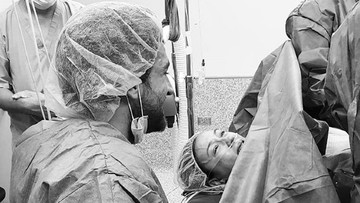
Solenn Heussaff at the delivery room with husband Nico
Bolzico (left)
Solenn Heussaff couldn’t have asked for a better start to 2020.
On New Year’s Day, the television host-actress gave birth to her first child—a baby girl that she and her husband, Nico Bolzico, named Thylane Katana.
“Best way to welcome 2020. So in love with you,” she wrote in a recent Instagram post. “Can’t believe you’re now in our arms.”
But her pregnancy wasn’t as smooth-sailing as she had initially expected it to be.
“Everything was fine” during her first five months: She continued to do show biz work, which included regular taping days for the prime-time series “Love You Two”; she had no morning sickness, mood swings or cravings.
“I thought I was having the easiest pregnancy ever,” the Kapuso artist, who got pregnant in April last year, related in a personal vlog that she filmed three weeks before she gave birth.
However, panic started to set in when she learned during a routine checkup that her baby wasn’t growing at its expected rate—its weight was only in the 10th percentile for its gestational age.
“She was growing, but she was a very small baby. We were worried,” Solenn said, adding that the two weeks that followed were some of the “worst of her life.”
“It all went by so slow; I couldn’t do anything. Nico and I were crying every day,” she related. “We thought I would have to give birth on my fifth month, which was a very scary thing.”
Solenn likewise found out that she had a risk for thrombosis, which had her doctor prescribing her blood thinners via injections.
She was put on a 3000-calorie diet—more than double of her average daily intake. “The food was already up here,” she said, motioning to her neck. “My doctor told me I had to eat more. Who knew eating could be so hard…”
But the measures paid off: The baby’s weight eventually went up to the 30th percentile. And a lot of it had to do with the help of Nico. “He was so good at being my nurse. He tended to me every day and gave me my injections.”
Having a solid support system also proved to be helpful. Nine of her friends were also expecting at that time, allowing them to share their experiences with each other or allay each other’s fears.
“Knowing that other people are going through the same thing as you makes you feel better about yourself; you try not to panic too much,” pointed out Solenn. “You go through things that you don’t learn at school. It has been a long journey. But I’m happy.”